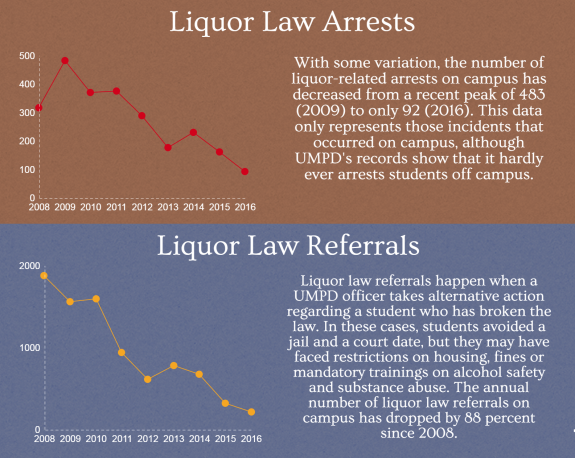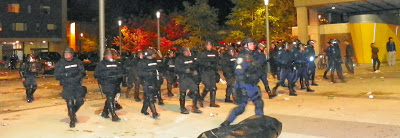By Liam O’Connor
Since 2008, liquor-related offenses on campus have decreased by huge margins, according to the University of Massachusetts Police Department. Annual security report data for the past eight years show a 75 percent decrease in liquor law arrests and an 88 percent decrease in liquor law referrals on campus.

As a publicly funded university, UMass is required to publish its crime records annually under the Clery Act. The most recent security report, published this past September, summarizes crimes committed on campus in 2016.
The language of the act defines “referrals” as instances in which a student is referred to “a campus official who initiates a disciplinary action of which a record is kept and which may result in the imposition of a sanction.”
As surprising as the massive decrease in liquor law violations may be, there is no clear explanation for it, according to Mary Dettloff, deputy director of the Office of News and Media Relations.
“There has been no change in the strict enforcement policies that UMPD has toward alcohol violations on campus,” Dettloff said, when asked whether the trend could be attributed to strategic differences in law enforcement over the past eight years.
“In the last few years, UMPD has ramped up its alcohol education at new student orientation so that new students are fully informed of local and state laws regarding alcohol,” Dettloff said. “That may be one specific strategy that is impacting the decline.”
Off-campus incidents include police interventions at house parties and events at apartment complexes like the Townehouses. Those crimes fall to the jurisdiction of the Amherst Police Department, which keeps separate records. Events that occur on campus like the 2013 World Series celebrations, however, can contribute to UMPD’s numbers for arrests and referrals in that year.

The trend may be related to increasingly competitive admissions at UMass in the past decade, with the average admitted student’s high school GPA rising from 3.58 in 2008 to a record-breaking 3.89 this past fall.
The Office of News and Media Relations declined to draw a connection between those two trends, however.
“I’m not sure we can pinpoint one specific reason why we are seeing declines in specific crimes on campus,” Dettloff said. She added that the same security reports indicate better behavior from students in other areas of the law.
“In addition to a drop in alcohol violations on campus, we are also seeing decreases in vandalism and bodily assaults (fighting) on campus,” Dettloff noted.
Dettloff said that the Dean of Students has recently been more proactive in educating students about campus policies.
“There has also been a significant increase in student support services, such as the Dean of Students, to handle referrals promptly so students are informed of the consequences of further problems immediately,” she said.
Diane Fedorchak, the director of the BASICS program – described online as a “drinker’s checkup” – agreed that the decline in violations could be due to larger trends of more responsible drinking and more effective policing.
“[This data] kind of goes with the downward trend of we’re seeing off campus as well with arrests going down, with community policing going up and [police] taking a more proactive approach toward addressing underage drinking with students,” said Fedorchak.
“It also mimics the downward trends of high risk drinking that our students are doing overall,” she added.
Fedorchak, who has worked in university health education since 2000, empathized with students, as liquor laws are hardly enforced at all at some UMass events.
“It gets a little confusing,” she said, “when you can walk around [outside] the stadium with 30 racks and nobody’s stopping you…like ‘why can I do it here, but I can’t do it there?'”
She concluded that clear policies with appropriate consequences attached to them are the most effective way to curb liquor law violations.
